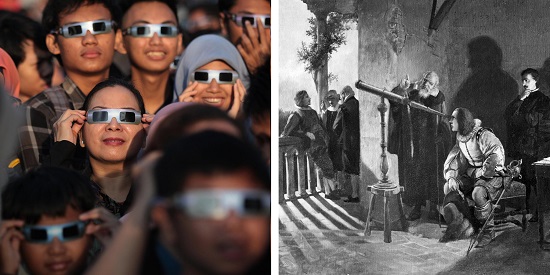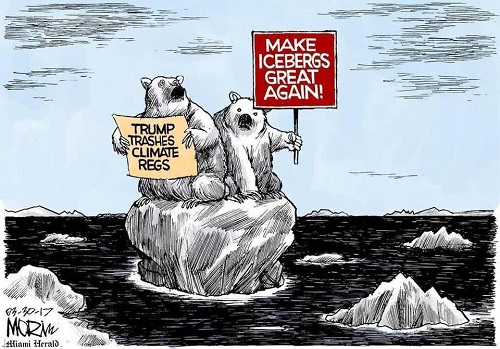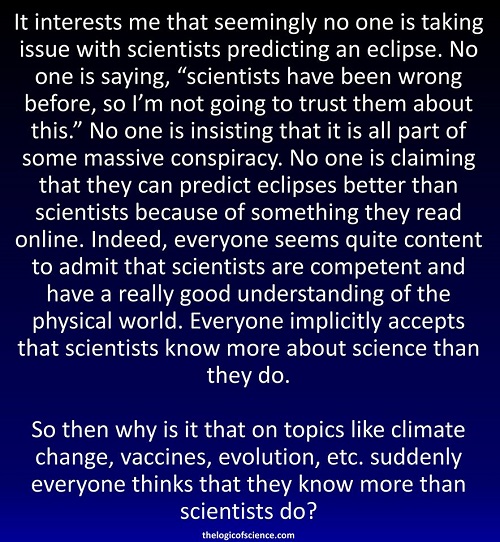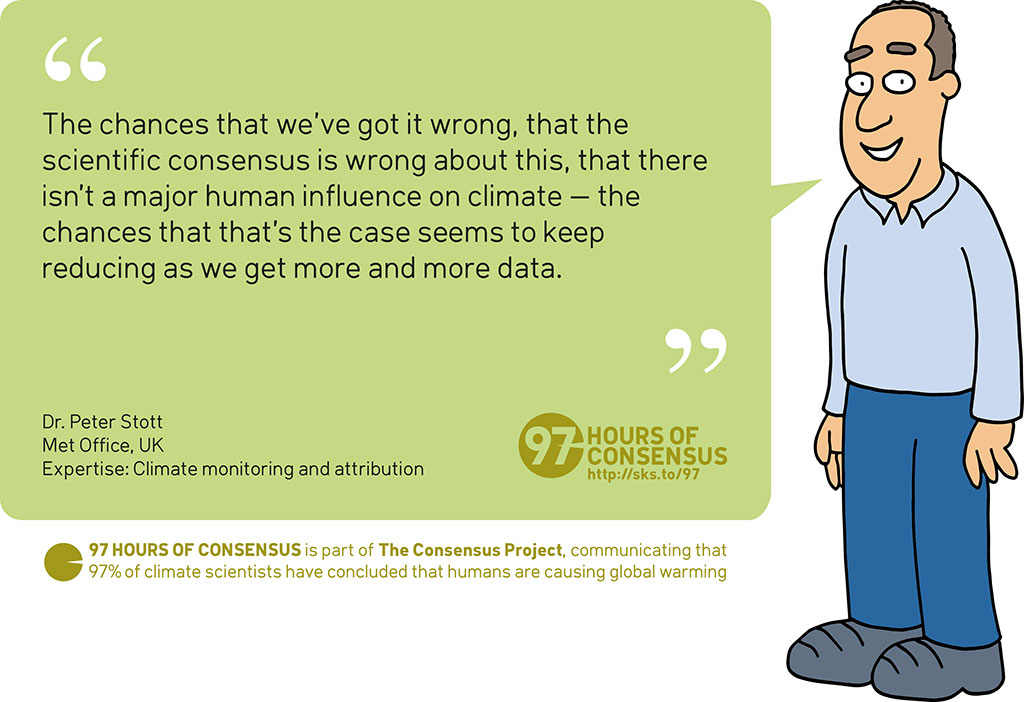2017 SkS Weekly Climate Change & Global Warming Digest #33
Posted on 20 August 2017 by John Hartz
Story of the Week... Editorial of the Week... El Niño/La Niña Update... Toon of the Week... Quote of the Week... Graphic of the Week... SkS in the News... SkS Spotlights... Video of the Week... Coming Soon on SkS... Poster of the Week... SkS Week in Review... 97 Hours of Consensus...
Story of the Week...
Should You Trust Climate Science? Maybe the Eclipse Is a Clue

At left, observing a solar eclipse in Indonesia in 2016. At right, a depiction of Galileo showing the poet John Milton his telescope.CreditLeft: Agoes Rudianto/Anadolu Agency, via Getty Images; Right: Bettmann, via Getty Images
Eclipse mania will peak on Monday, when millions of Americans will upend their lives in response to a scientific prediction.
Friends of mine in Georgia plan to drive 70 miles to find the perfect spot on a South Carolina golf course to observe the solar eclipse. Many Americans will drive farther than that, or fly, to situate themselves in the “path of totality,” the strip of the country where the moon is predicted to blot out the sun entirely.
Thanks to the work of scientists, people will know exactly what time to expect the eclipse. In less entertaining but more important ways, we respond to scientific predictions all the time, even though we have no independent capacity to verify the calculations. We tend to trust scientists.
Should You Trust Climate Science? Maybe the Eclipse Is a Clue by Justin Gillis, Climate, New York Times, Aug 18, 2017
Editorial of the Week...
How, then, might we interpret both the fear and wonder of this week’s solar eclipse in a contemporary context?
I suggest we take it as a call to action on climate change. On Monday, Aug. 21 — or, by the Jewish calendar, the eve of Rosh Chodesh Elul, a month devoted to reflection and repentance — the source of life on Earth will, for a moment or two, go dark, from coast to coast across the world’s most powerful nation. And then, just as scientifically predictably — and, at the same time, still miraculously — the light and warmth that sustain us will return. Let this awesome event serve as a reminder that unless we change our behavior as a species, in the future, we may not be so lucky. The damage that we are doing to our planet — and our own civilization — with our profligate devastation of Earth’s natural systems is not so easily undone. May the temporary eclipse of the sun awaken us to the wisdom of philosopher and naturalist Kathleen Dean Moore: “To let the world slip away — the starfish and sea anemones, the green and fecund marshland, the glacial streams — to let it slip away because we’re too busy, or too comfortable to change, is a sin against creation.”
Let Monday’s eclipse be a call to action on climate change, Opinion by Rabbi Dan Fink, Idaho Statesman, Aug 18, 2017
El Niño/La Niña Update
Now that it’s summer in the Northern Hemisphere, we’re more firmly on the other side of the infamous spring barrier. So, forecasters have growing confidence that this coming winter in the Northern Hemisphere will most likely be a continuation of “ENSO-Neutral,” and dominated by near average temperatures across the Pacific Ocean. The most recent forecast by CPC/IRI favors the continuation of these conditions through the winter 2017-18 (56% chance during December-February 2017-18).
August 2017 ENSO update: Extreme neutral! by Michelle L'Heureux, NOAA's Climate.gov, Aug 10. 2017
Toon of the Week...

Quote of the Week...
e360: You’ve written that when it comes to climate change, “I refuse to give in to despair. I just don’t have time for that. I’m too busy doing science.” Tell me more about the roll-up-your-sleeves attitude you’ve got.
Marvel*: People ask me, “Aren’t you just depressed all the time? How do you keep going in the face of this?” We’re all going to die. You know, there’s not a lot of good news there. But we all manage to find happiness and fun in our lives anyway. And I do have hope, I do think that we are an amazing species; and we do a lot of terrible things, but we also do a lot of very good things. I do have hope in human ingenuity. I don’t think we peaked with the internal combustion engine. So that gives me hope.
Going back to your question about NASA satellites, the fact that we as a species can look at our planet from above, that’s amazing. The fact that we understand how the planet actually works, and we keep continuing to ask these questions — that gives me hope. That makes me optimistic about the future of our species.
*Kate Marvel, a physicist at Columbia University and a researcher at NASA’s Goddard Institute for Space Studies
Investigating the Enigma of Clouds and Climate Change by Diane Toomey, Yale Environment 360, Aug 17, 2017
Graphic of the Week...

The GISTEMP monthly temperature anomalies superimposed on a 1980-2015 mean seasonal cycle. View larger image or PDF.
SkS in the News...
John Cook is quoted in Alexander C. Kaufman's HuffPost article, Al Gore’s Stupendous Wealth Complicates His Climate Message. That Can Change...
“Rather than hide from his wealth, he should talk about it more, and talk about the opportunities in solar power,” said John Cook, a research assistant professor at George Mason University’s Center for Climate Change Communication. “It’s only polarizing in the sense that it gets criticized by opponents of climate action because it’s effective. You have to recognize the fact that the forces of the status quo will come after anything that’s effective.”
“Regardless of whether you like or dislike him, the net effect that he’s had has been overwhelmingly positive by mobilizing so many people who reach people Al Gore would never reach,” he added. “You can’t dismiss his contributions just [because] he makes conservatives cranky.”
John Cook penned an original article, EPA chief Pruitt borrows from an old but effective denialist playbook for the Bulletin of Atomic Scientists.
In her Los Angeles Times article, What should you say to a climate change skeptic?, Mira Abed links to Consensus on consensus: a synthesis of consensus estimates on human-caused global warming, Cook et al, , ,
SkS Spotlights...
Your forecast, with climate context. Your weather, explained. Your world, made a little clearer.
WXshift (pronounced "weather shift") is a collection of ?independent journalists, ?climate scientists, and ?meteorologists working to bring you the latest in weather and climate information.
Our team is committed to providing you with the most up-to-date weather forecasts, news and information, all with local and relevant climate context.
This? site is a project of Climate Central, an independent group of journalists, and leading scientists and researche?rs who are committed to communicating the science and effects of climate change. We are a non-partisan, non-advocacy organization and we do not support any specific legislation, policy or bill.
We're here to simply make your day brighter (unless it's raining, of course).
Video of the Week...
EPA chief Pruitt borrows from an old but effective denialist playbook by John Cook, Bulletin of the Atomic Scientists, Aug 18, 2017
Coming Soon on SkS...
- Solar eclipse: Why the sun is not responsible for recent climate change (Zeke)
- SkS 10th birthday (Baerbel)
- Harvard scientists took Exxon’s challenge and found them using the tobacco playbook (Dana)
- Guest post (John Abraham)
- Why the 97% climate consensus is important (Dana, John Cook, Sander van der Linden, Ed Maibach, Tony Lieserowitz)
- 2017 SkS Weekly Climate Change & Global Warming News Roundup #34 (John Hartz)
- 2017 SkS Weekly Climate Change & Global Waming Digest #34 (John Hartz)
Poster of the Week...

SkS Week in Review...
- 2017 SkS Weekly Climate Change & Global Warming News Roundup #33 by John Hartz
- Problems For Oil by Riduna
- Analysis: Why US carbon emissions have fallen 14% since 2005 by Zeke Hausfather (Carbon Brief)
- In defense of not being serious in climate communication, Video by Climate Adam
- Yale Climate Connections: America's beacon of climate science awareness by John Abraham (Climate Consensus - the 97%, Guardian)
- 2017 SkS Weekly Climate Change & Global Warming Digest #32 by John Hartz
97 Hours of Consensus...

Quote derived with author's permission from:
"... the chances that we’ve got it wrong, that the scientific consensus is wrong about that this, that there isn’t a major human influence on climate — the chances that that’s the case seems to keep reducing as we get more and more data."































 Arguments
Arguments






























Comments